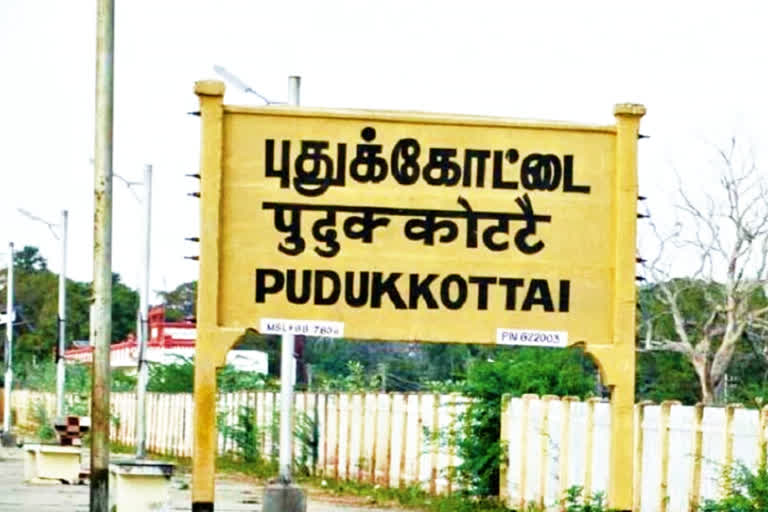Chennai: A demand for honouring a former king, the last Tamil ruler of a princely state, has come from unexpected quarters. It was not by any of his lineage, but by a DMK Rajya Sabha member from Pudukkottai. Raising the issue in the upper house, MM Abdullah urged the government to issue a postal stamp to commemorate Rajagopala Thondaiman.
A tiny landlocked state in southern Tamil Nadu, it was spread over 3,050 km during the colonial era. Founded as a feudatory of the Ramanathapuram kingdom following matrimonial ties with the erstwhile chieftains of the Vijayanagara empire, around 1680, it got expanded further with additional territory from Thanjavur and Sivaganga.
The ruling clan were from the northern part of the Tamil country, then called Thondai mandalam and hence the surname, Thondaiman. Serving in the army of Vijayanagara kingdom at Tirupati, they migrated to Pudukkottai when the military was in engagement. Their ties with the British were cemented when they sided with them in the Anglo-French war and helped Mohamed Ali become the Nawab of Carnatic.
Though reforms were ushered in, the kingdom was lagging behind the other parts of the Madras Presidency which was under the direct rule of the British. A college was established in 1857 during the reign of Ramachandran Thondaiman and later trial courts and a high Court were established. The royals were great patrons of art and culture. The last king was the patron of the Theatre Company of which popular film star of yesteryears, Gemini Ganesan, father of Bollywood actor Rekha, was the president. There is a Pudukkottai style of playing Mridangam, an inseparable percussion instrument of Carnatic music. Music maestro Ilayaraja had learnt the nuances of playing certain instruments like Kanjira from musicians here.
It was under these royals that Pudukkottai was remodeled as a modern town with lakes, incorporating principles of town planning in 1878 and hence the name 'Pudukkottai' (New Fort). Later, during the reign of the last king, Rajagopala Thondaiman, the new palace was built in 1930 which now houses the district collectorate. Freedom fighter and Congress stalwart Sathyamurthy as well as social reformer Muthulakshmi Reddi, the first woman doctor of the country, who established the Cancer Institute in Chennai and who was instrumental in the abolition of the Devadasi system, were from Pudukkottai. Despite fierce opposition to her admission into the college from conservative sections, she completed her studies and got enrolled at Madras Medical College. Former AIADMK strongman Thirunavukkarasar, who was a former Union Minister in the Vajpayee government and now a Congress MP, is also from here. He has never lost an election to the assembly from Aranthangi in the district.
Rajagopala Thondaiman, the ninth and last of the Thondaiman rulers, was crowned the king when he was six years old. His predecessor, Marthanda Bhairava Thondaiman, had married an Australian lady and had a son. But, the locals and the British were opposed to it. He later settled in Paris and died in London. When the country attained independence, the king, heeding the appeal of Sardar Patel, merged his state with the Indian Union on March 3, 1948. Handing over the treasury in entirety – Rs 72 lakh and jewellery, he later vacated the palace for the Collectorate when the district was carved out in 1972. A bachelor and a spartan, he lived the rest of his life in Trichy and passed away in 1997. It was to his credit that he passed a royal decree to allow Dalits into temples, prior to the accession with India
Since the state remaining under monarchy had helped preserve the native flora, especially medicinal plants, unlike other parts where the natural resources were plundered. “Only in Pudukkottai and in the districts under the Travancore state, we still find rare medicinal herbs and the reason was the regions remaining out of complete British control,” says Dr Michael, Siddha practitioner and researcher. Also important from a sociological point of view is the high prevalence of social discrimination and atrocities against Dalits, which is also attributed to this. Now, Pudukkottai is in the news for all the wrong reasons after the incident of mixing feces in the drinking water OHT for Dalits at Vengaivayal, close to Pudukkottai town. The inquiry had been entrusted to the CB-CID and more than a month after the incident, no arrest has been made yet. Temple entry still remains contentious in many villages of this district.
Till date, the royal family suffers the ignominy of their ancestor Vijaya Raghunatha Thondaiman capturing and handing over Veerapandiya Kattabomman, a chieftain of Panchalamkurichi near Tirunelveli, who refused to pay taxes to the British and fought against them. He was captured near Thirumayam while fleeing the British on October 1, 1799, and hanged five days later at Kayathar. While Kattabomman has become immortal and his bravery is part of folklore, the Pudukkottai royals are looked down as betrayers. A movie on Kattabomman with the late thespian Sivaji Ganesan playing the lead was a box office hit.


